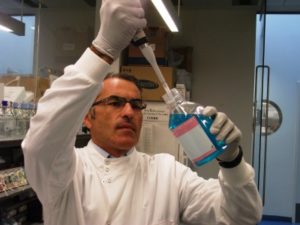 The study is published in the journal Oncogene and was led by Queen Mary University of London and Curtin University, Australia.
The study is published in the journal Oncogene and was led by Queen Mary University of London and Curtin University, Australia.
Cannabis plants contain over 100 active chemicals called cannabinoids, which have different effects on the body. The study tested the impact of one of these, cannabidiol (CBD), on the use of the commonly used chemotherapy drug gemcitabine, when treating mice with pancreatic cancer.
The findings show that CBD interferes with receptors on proteins produced by a gene known as GPR55, preventing them from interacting with other molecules that help cancer cells to grow and spread. The team also reported that CBD helps to delay the cancer from becoming resistant to gemcitabine.
Lead researcher Professor Marco Falasca from Queen Mary University of London described the study results as “remarkable”.
Prof Falasca added: “Cannabidiol is already approved for use in clinics, which means we can quickly go on to test this in human clinical trials. If we can reproduce these effects in humans, cannabidiol could be in use in cancer clinics almost immediately, compared to having to wait for authorities to approve a new drug.”
CBD does not cause psychoactive effects, as opposed to tetrahydrocannabinol (THC) – the cannabinoid known to cause the psychoactive effects in cannabis. As such, CBD is already cleared for use in the clinic, and does not face the same challenges as products including cannabis oil, which contain controlled substances such as THC.
The researchers added that CBD is also known to improve the side effects of chemotherapy, including nausea, diarrhoea and vomiting, meaning it could also improve the quality of life of patients undergoing chemotherapy.
The study only looked at the effect of this treatment in mice, and clinical trials in humans are needed to confirm whether or not CBD helps improve survival of pancreatic cancer patients.
PCRF’s Chief Executive, Maggie Blanks, said: “It’s certainly an intriguing result and we would be very interested to see if the findings could be replicated in those patients whose pancreatic cancer was driven by this gene.
“It’s also heartening to know that CBD in combination with gemcitabine could be tested in people more quickly than brand new therapies as the need for new treatments is particularly urgent for pancreatic cancer.”
The research was supported by Pancreatic Cancer Research Fund and the Avner Pancreatic Cancer Foundation and also involved researchers from The Beatson Institute for Cancer Research in Scotland.
